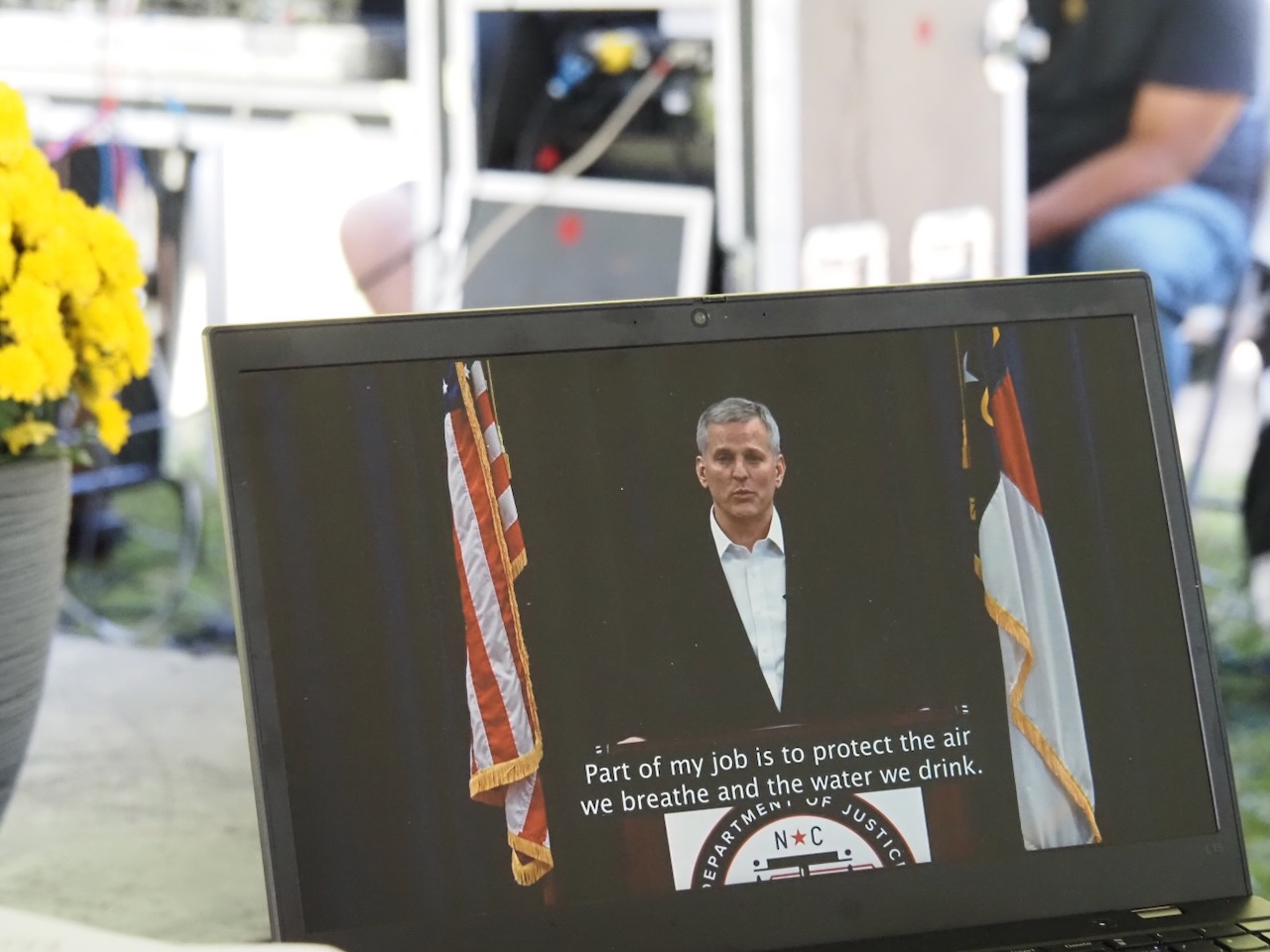North Carolina Attorney General Josh Stein via a video message and DEQ Chief of Staff Cornelius “CJ”Jordan as keynote speaker offered perspectives on the state’s clean energy initiatives during Thursday’s Solarfest.
Solarfest serves as the Center for Energy Education’s signature annual event.
“I thank you for all that you do to build and promote North Carolina’s clean energy economy,” Stein said.
Reflecting on his tenure in the state senate, the attorney general said, “The first bill I ever introduced was an expansion and extension of the renewable energy tax credit. Along with the renewable energy portfolio standards, that tax credit helped North Carolina arrive at number two in the country in installed solar.”
As attorney general, Stein said he has continued to help the state transition to a clean energy economy. “Part of my job is to protect the air we breath and the water we drink and that includes protecting North Carolina’s natural resources and combating the climate crisis. We do this not only for ourselves, but our children and grandchildren. They deserve to live on a healthy planet so they too can live successful lives.”
Said Stein: “That’s one reason I fought back against the Trump administration’s rollback on environmental protection including the clean car standards and the clean power plant. We should be focused on preventing air pollution and limiting greenhouse emissions.”
The attorney general said he has intervened in a case at the North Carolina Utilities Commission to protect net metering programs which have helped North Carolina be a leading state in solar installations. “We need to pursue more clean energy initiatives that are good for the environment, the economy and North Carolinians’ wallets.”
Said Stein: “I’m grateful for all that you do for the people of North Carolina and I look forward to working with you in the months and years to come, God willing, to keep fighting for a clean energy future with good-paying jobs, healthier people and greater national security.”
DEQ perspective
Jordan said he could tell from driving up to the center that the event means a lot to the community. “It means a lot because Governor (Roy) Cooper made sure someone from his administration was here. He wanted to make sure everyone understands that clean energy and making sure our rural communities know that their voices are heard and that they know and understand that every single thing he’s doing in his administration is going to drive clean energy forward for the state of North Carolina.”
https://www.rrspin.com/news/7946-solarfest-audience-hears-state-s-clean-energy-perspectives.html#sigProIdd145f7dd42
One of the top priorities at DEQ is addressing climate change and transitioning to a clean energy future. “Under Governor Cooper’s leadership, North Carolina is leading on this front. People are coming to North Carolina to figure out how we’re doing it — how we are rated the best state to do business in. It’s because we care about North Carolinians. We put that first.”
He said the state has set ambitious goals — 50 percent reduction in carbon emissions by 2030 and net zero by 2050. “You may think that’s a long way away but it’s not.”
Jordan said the initial goals of the center when it began to form are serving the state now. “No one had the dream and thought the outcome of this right here would be the future. But when we put our minds to it and we put our minds to making sure the future is better … and making sure we invest in our future which is our children and grandchildren, we can do great things together.”
The department is driven by three key principles — ensure that energy is clean, reliable, and affordable.
Executive Order 246, Jordan said, reaffirms a commitment to hold to bold climate action and reducing greenhouse gasses. “He (the governor) prioritizes environmental justice and workforce development over everything else, once again driving home that you just can’t wave a dollar in someone’s face and say, ‘Hey, I’m going to come to your community and pollute,’ or I’m going to wave a dollar in your face and say, ‘You want this job so I’m going to put this in your community.’”
The aim, he said, is making sure North Carolina is the place where people can get good jobs. “We have drive, ambition, and dedication — brilliant young people from all walks of life.”
North Carolina has had unprecedented support at the federal level, Jordan said. “Our former secretary is the administrator of EPA and he’s allowed us to have a real voice at that table. We’ve been able to achieve great things. Governor Cooper has it set up to make sure we receive federal funds that we’ve never seen before such as the Inflation Reduction Act, bi-partisan infrastructure law which is part of the largest ever clean energy investment in U.S. history.”
Jordan said the state is on track to receive large sums of dollars coming in related to clean energy. “The work we’re going to use that money for includes programs such as weatherization assistance programs … by repairs and upgrades at no cost.”
Since 2018, the program has helped over 7,655 homes become weatherized.
With $89.7 billion in federal investment coming from the bi-partisan infrastructure law, “We anticipate adding an additional 6,000 low income homes when it comes to weatherization.”
The DEQ state energy office has more than $143 million in federal funding for weatherization, clean energy and transportation. “We’re applying for even more federal funding.”
The department is part of the federal funding of the Solar for All grant and if awarded the program will help low income communities “and transform North Carolina’s solar market forever. If we are awarded these funds this will transform the way we do things in North Carolina for the future. It will make North Carolina be seen as we already know we are — the pioneers when it comes to clean energy.”
The energy sector, he said, is growing twice as fast as the rest of the economy. “Energy jobs pay more and employ more veterans than any sector. Our veterans hold more energy jobs than the national average. In the solar industry alone, 90 percent of all workers are veterans.”
Said Jordan: “It’s programs like this that will make us a better nation. It’s programs like this that will make us a better state. It’s programs like this that are going to make people come back to the rural communities and understand the benefits that are here.”
Education programs such as those at the center, he said, “Are beneficial not only for the people in this community but are beneficial to people outside of this community because they can look at this as being a model. You dreamed it — you got it here. People believe in it. It’s something we have to showcase … We value organizations like this — one who’s helping to educate the community and change the way that people think and train the climate leaders of the future.”
The training at the center, Jordan said, “Is what’s going to make North Carolina great. It’s going to take all of us. It’s going to take governments, non-profits, academia, business, all working together to make this work. We can’t do it alone.”









